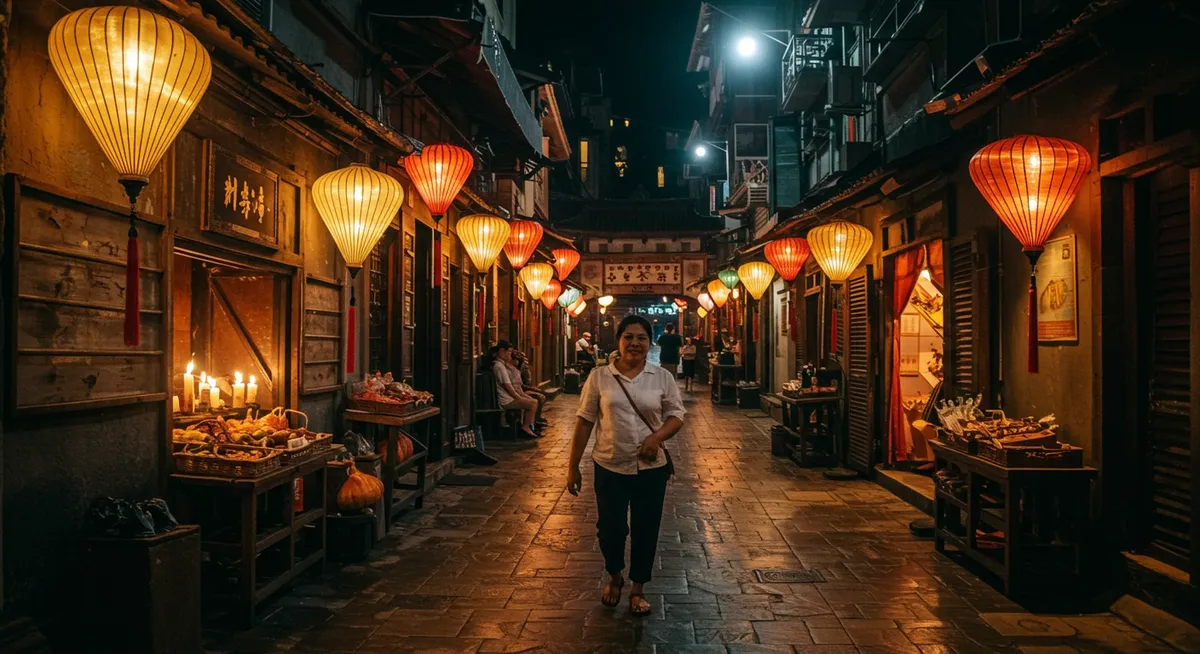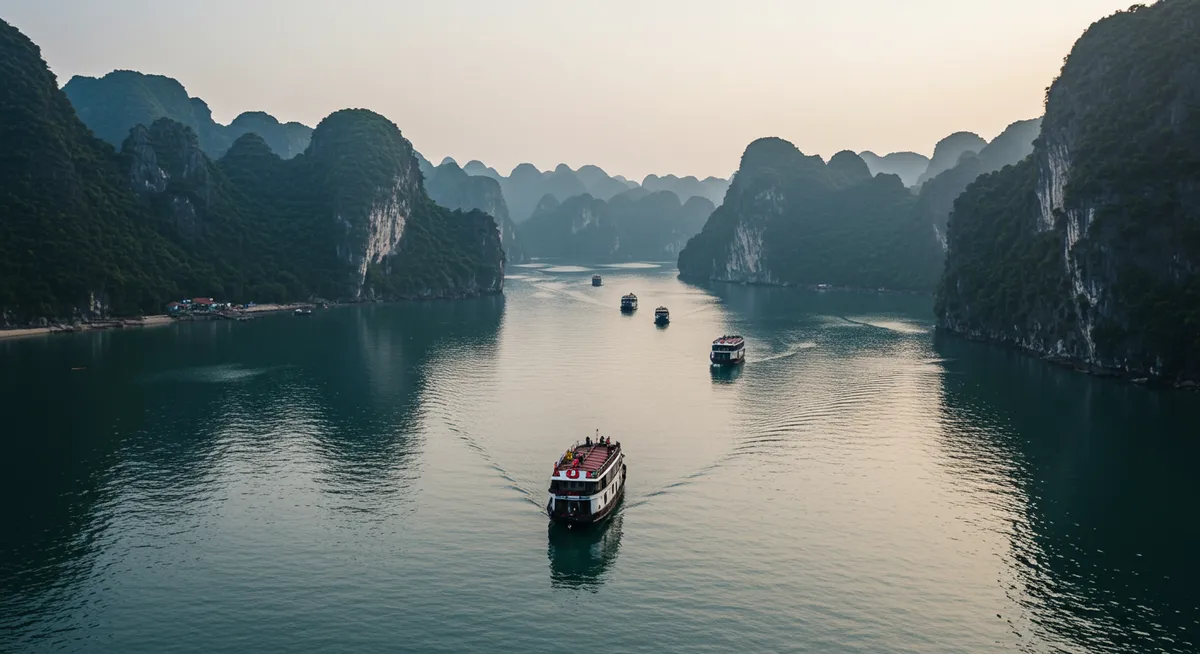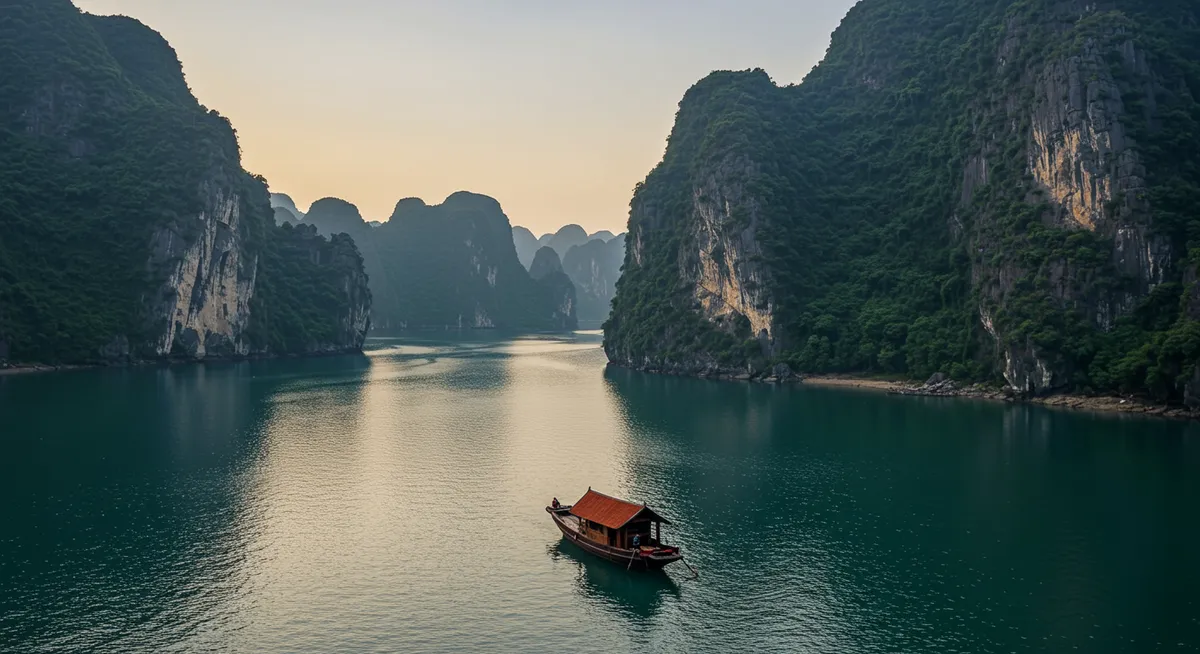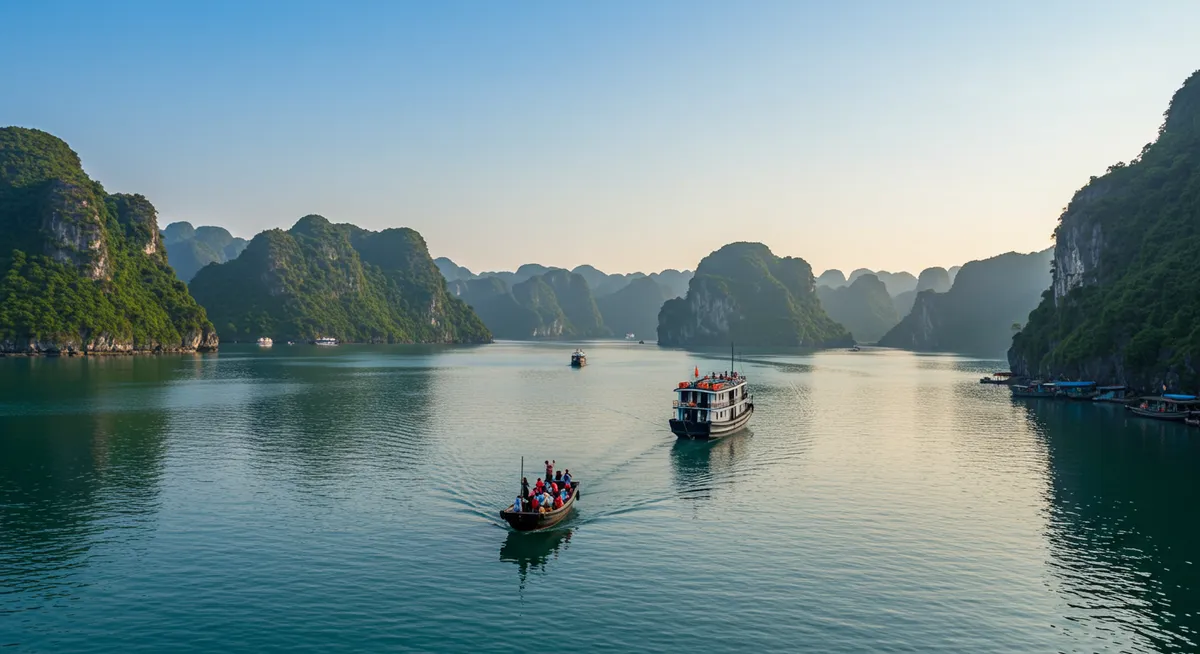
Vietnam Travel Tips: Your Ultimate Guide for an Unforgettable Trip
Table of Contents
Want to find the best travel deals for this destination? Chat with our travel hacking specialist!
Get Travel HacksCategory: vietnam-travel-tips
The Ultimate Guide to Vietnam Travel Tips: Navigating Your Adventure
Embarking on a journey to Vietnam promises an unparalleled blend of vibrant culture, breathtaking landscapes, and delicious cuisine. As a seasoned traveler who has explored the country extensively, I understand that preparing for such an adventure can feel overwhelming. That's why I've distilled years of experience into this comprehensive guide, offering the most crucial Vietnam travel tips to ensure your trip is not just good, but truly unforgettable.
This pillar article serves as your definitive resource, covering everything from visa requirements and budgeting to cultural etiquette and navigating local transportation. We'll delve into practical advice for safety, health, and staying connected, ensuring you're well-equipped for any situation. My goal is to empower you with the knowledge needed to confidently explore Vietnam's wonders, from the bustling streets of Hanoi to the tranquil waters of the Mekong Delta, making your adventure seamless and deeply enriching.
Planning Your Dream Vietnam Trip: Visas, Seasons, & Budget
Careful preparation is the cornerstone of any successful journey, and understanding the logistics is paramount for Vietnam. One of the most critical Vietnam travel tips is to address visa requirements well in advance. Most foreign visitors will need a visa, which can be obtained through an e-Visa online, a visa on arrival (with a pre-approval letter), or directly from a Vietnamese embassy. Always check the latest regulations specific to your nationality, as policies can change. For instance, as of 2024, processing times can vary, so apply at least a month before your departure.
Choosing the best time to visit Vietnam depends on your itinerary, given the country's diverse climate zones. The north experiences distinct seasons, with cool, dry winters and hot, humid summers. Central Vietnam often faces typhoons in late summer and autumn, while the south is generally hot year-round with a clear dry season from December to April. Personally, I find spring (March-April) and autumn (September-November) ideal for balancing good weather across multiple regions. Finally, budgeting for your Vietnam trip involves balancing comfort with cost. Backpackers might spend $25-40 USD per day, while mid-range travelers could expect $50-100 USD. Luxury options easily exceed this. Accommodation, street food, and local transport are generally inexpensive, but activities like Halong Bay cruises can add up. Consider leveraging general travel hacks to save money.
Navigating Vietnam: Transportation & Getting Around Efficiently
Getting around Vietnam is an adventure in itself, offering various modes that cater to different preferences and budgets. For long distances, domestic flights between major cities like Hanoi, Da Nang, and Ho Chi Minh City are incredibly efficient, saving valuable time. For a more authentic experience, overnight trains connect key destinations, offering a glimpse into local life, though they can be slower. Buses are the most budget-friendly option, with extensive networks connecting nearly every town. However, journeys can be long and comfort levels vary.
Within cities, Grab (Southeast Asia's version of Uber) is indispensable. It offers rides via cars and motorbikes, with fixed prices that eliminate haggling—a vital Vietnam travel tip for avoiding scams. Just ensure your phone has data, easily acquired with a local SIM card. Taxis are also plentiful, but always opt for reputable companies like Mai Linh or Vinasun and insist on the meter. For short distances, 'xe om' (motorbike taxis) are ubiquitous; agree on a price beforehand. While renting a motorbike offers ultimate freedom, it's only recommended for experienced riders due to chaotic traffic and varying road conditions. I personally stick to Grab for urban travel, finding it the safest and most convenient option.
Savoring Vietnam: Accommodation, Food, & Culinary Adventures
Vietnam offers a diverse range of accommodation options, from luxurious international hotels and charming boutique guesthouses to budget-friendly hostels and authentic homestays. Booking in advance, especially during peak season or for specific locations like Hoi An's Old Town, is a smart Vietnam travel tip. Homestays, particularly in rural areas like Sapa or the Mekong Delta, provide an immersive cultural experience often including home-cooked meals with your host family.
The culinary scene in Vietnam is, without exaggeration, a highlight of any trip. Vietnamese food is celebrated globally for its fresh ingredients, vibrant flavors, and incredible variety. Don't leave without trying Pho (noodle soup), Banh Mi (savory baguette sandwich), fresh spring rolls, and regional specialties. Street food is king here; look for bustling stalls with high turnover for the freshest ingredients. My personal advice is to be adventurous but cautious: always choose places where food is cooked to order and served hot. If you have dietary restrictions, learning a few key Vietnamese phrases for 'no meat' or 'no nuts' can be incredibly helpful. Furthermore, remember that Vietnam's coffee culture is legendary; try the potent 'ca phe sua da' (iced coffee with condensed milk) for a truly local kick.
Embracing Local Culture: Etiquette & Respectful Interactions
Understanding and respecting local customs is crucial for a smooth and enriching journey through Vietnam. One of the most important Vietnam travel tips for cultural immersion is to dress modestly, especially when visiting pagodas, temples, or local homes. Shoulders and knees should be covered. When entering a Vietnamese home or a sacred site, always remove your shoes. While Western-style greetings are common, a slight nod or bow is appreciated as a sign of respect, especially to elders.
Bargaining is common in markets, but do so politely and with a smile; it's a negotiation, not a confrontation. Over-bargaining for small items is often seen as disrespectful. Learning a few basic Vietnamese phrases like 'Xin chào' (hello), 'Cảm ơn' (thank you), and 'Không' (no) will go a long way in connecting with locals and showing your effort. Personal space can be less defined than in Western cultures, especially in crowded areas. When taking photos, always ask for permission before photographing individuals, particularly children. I've found that a genuine smile and an attempt at basic communication can open doors to incredible interactions and warm hospitality across Vietnam.
Health & Safety in Vietnam: Staying Well & Secure
Prioritizing your health and safety is a paramount Vietnam travel tip for a worry-free vacation. Before you travel, consult your doctor about recommended vaccinations, which often include Hepatitis A & B, Typhoid, and Tetanus. Dengue fever is also a concern, so consistent mosquito protection (repellent, long sleeves) is essential, especially at dawn and dusk. Always drink bottled water or use a water filter, and avoid ice in drinks unless you're sure it's made from filtered water. Hand sanitizer is your best friend, particularly before eating street food.
While generally safe, petty crime like bag snatching is common in bustling cities like Ho Chi Minh City and Hanoi. Keep valuables out of sight, carry minimal cash, and use cross-body bags or money belts. Be wary of overly friendly strangers who offer unsolicited help or invite you to play games, as these are often precursors to scams. Taxi scams, where meters are rigged or routes are extended, can be avoided by using reputable apps like Grab or well-known taxi companies. It's also highly recommended to invest in comprehensive travel insurance that covers medical emergencies, trip cancellations, and theft. I always ensure my policy includes emergency evacuation, just in case.
Money Matters & Staying Connected: Currency, ATMs, & SIM Cards
Navigating currency and staying connected are practical Vietnam travel tips that can significantly enhance your experience. The official currency is the Vietnamese Dong (VND). While major hotels and some tourist shops accept credit cards, cash is king, especially for street food, local markets, and smaller establishments. ATMs are widely available in cities and larger towns, but they often have withdrawal limits and can charge fees. It's wise to inform your bank of your travel plans to avoid card freezing. I always carry a mix of smaller denominations (50,000 – 200,000 VND notes) for daily expenses and larger ones for bigger purchases.
Staying connected is easy and affordable in Vietnam. Purchasing a local SIM card upon arrival at the airport or from a local mobile shop is highly recommended. Providers like Viettel, Mobifone, and Vinaphone offer various prepaid data packages at very reasonable prices. A local SIM provides reliable internet access for navigation (Google Maps is essential!), communication, and using ride-hailing apps like Grab. This connectivity is invaluable for independent travel. Public Wi-Fi is also widely available in hotels, cafes, and restaurants, though speeds can vary. Downloading offline maps before you arrive is another smart move, especially for rural areas or in case of unexpected connectivity issues.
Unmissable Experiences: Top Destinations & Activities in Vietnam
Vietnam is a country of immense diversity, offering a plethora of experiences for every type of traveler. To truly maximize your adventure, these Vietnam travel tips on top destinations are crucial. In the north, explore the ancient charm of Hanoi with its Old Quarter and vibrant street life. A quintessential experience is a cruise through the emerald waters and karsts of Halong Bay, a UNESCO World Heritage site. Further north, the terraced rice fields of Sapa offer incredible trekking opportunities and insights into ethnic minority cultures.
Central Vietnam boasts the imperial city of Hue, rich in history with its majestic citadel and royal tombs. Nearby, Hoi An captivates with its lantern-lit ancient town, tailor shops, and culinary delights. Da Nang offers stunning beaches and modern amenities. In the south, the bustling metropolis of Ho Chi Minh City (formerly Saigon) is a hub of commerce and history, with sites like the Cu Chi Tunnels and War Remnants Museum. For a taste of rural life, a boat trip through the Mekong Delta reveals floating markets, fruit orchards, and traditional villages. And for relaxation, the pristine beaches of Phu Quoc island provide a tropical escape. Don't try to see everything; instead, focus on experiencing the unique character of each region that truly calls to you.
Packing Smart for Vietnam: Essentials & Practical Gear
Packing efficiently is one of the most understated yet crucial Vietnam travel tips. Given Vietnam's diverse climate, from the cooler northern mountains to the tropical south, versatile clothing is key. Lightweight, breathable fabrics like cotton or linen are ideal, as are quick-drying garments, especially if you plan on washing clothes frequently. Pack layers, particularly if visiting the north during winter or Sapa, where temperatures can drop significantly.
Comfortable walking shoes or sandals are a must, as you'll likely do a lot of exploring on foot. Don't forget a universal travel adapter for your electronics, and a portable power bank is invaluable for keeping your phone charged on the go. Sunscreen, a wide-brimmed hat, and insect repellent (containing DEET or picaridin) are non-negotiables to protect against the sun and mosquitoes. A small first-aid kit with basics like pain relievers, antiseptic wipes, and band-aids is always a smart addition. For my travels, I also always pack a reusable water bottle to help reduce plastic waste and a compact umbrella for sudden downpours or sun protection. Remember, less is often more when backpacking through Southeast Asia; you can always buy essentials locally if needed.
Responsible Travel in Vietnam: Sustainable & Ethical Practices
As travelers, we have a responsibility to minimize our impact and contribute positively to the places we visit. These Vietnam travel tips focus on making your journey more sustainable and ethical. Firstly, strive to reduce plastic waste. Vietnam faces significant challenges with plastic pollution, so carrying a reusable water bottle and refilling it at hotels or cafes that offer filtered water is a simple yet impactful step. Similarly, decline plastic straws and bags whenever possible.
Support local businesses and communities directly. Choose to eat at family-run restaurants, buy souvenirs from local artisans, and opt for homestays or locally owned guesthouses. This ensures your money directly benefits the people who need it most. Be mindful of your consumption of resources like water and electricity. When participating in tours, especially those involving animals (e.g., elephant encounters or snake farms), research their ethical practices beforehand to ensure they prioritize animal welfare. Avoid giving money directly to beggars, particularly children, as it can perpetuate cycles of poverty and discourage school attendance. Instead, consider donating to reputable local charities. By traveling consciously, we can help preserve Vietnam's natural beauty and rich culture for future generations.
Frequently Asked Questions
Is Vietnam safe for tourists?
How much does a trip to Vietnam cost?
Do I need a visa for Vietnam?
What's the best way to get around Vietnam?
Can I drink tap water in Vietnam?
What currency is used in Vietnam and how should I manage money?
What are the must-try foods in Vietnam?
Vietnam is a country that truly captivates the soul, offering an incredible tapestry of history, culture, and natural beauty. By equipping yourself with these essential Vietnam travel tips, you're not just preparing for a trip; you're setting the stage for an immersive and unforgettable adventure. From understanding visa requirements and navigating local transport to savoring the world-renowned cuisine and respectfully engaging with local customs, every piece of advice in this guide is designed to empower your journey.
Remember, the best travels often involve a blend of careful planning and spontaneous discovery. Embrace the unexpected, engage with the warmth of the Vietnamese people, and allow yourself to be swept away by the unique charm of this incredible nation. Your Vietnamese adventure awaits, ready to create memories that will last a lifetime. Safe travels!
Key Takeaways
- Secure your Vietnam visa well in advance, verifying the latest requirements for your nationality.
- Prioritize health and safety: consider vaccinations, use insect repellent, and always drink bottled water.
- Embrace local culture by dressing modestly, learning basic phrases, and bargaining politely in markets.
- Utilize ride-hailing apps like Grab for convenient and fair-priced transport within cities.
- Dive into Vietnam's culinary scene; street food is a must-try, but choose busy, reputable stalls.
Related Posts

Hanoi to Halong Bay: Bus Distance & Time
Hanoi to Halong Bay distance by bus is typically 160-170 km. Discover common travel times, bus options, and essential tips for your journey to this stunning UNESCO site.

How Long is the Drive from Hanoi to Halong Bay?
Discover how long is the drive from Hanoi to Halong Bay, plus factors affecting travel time. Get tips for a smooth journey in 2024.

Is Halong Bay Worth It? Your Ultimate Guide
Is Halong Bay worth it? Discover if this UNESCO World Heritage site lives up to the hype for your Vietnam itinerary. Get insights on cruises, costs, and tips for an unforgettable trip.